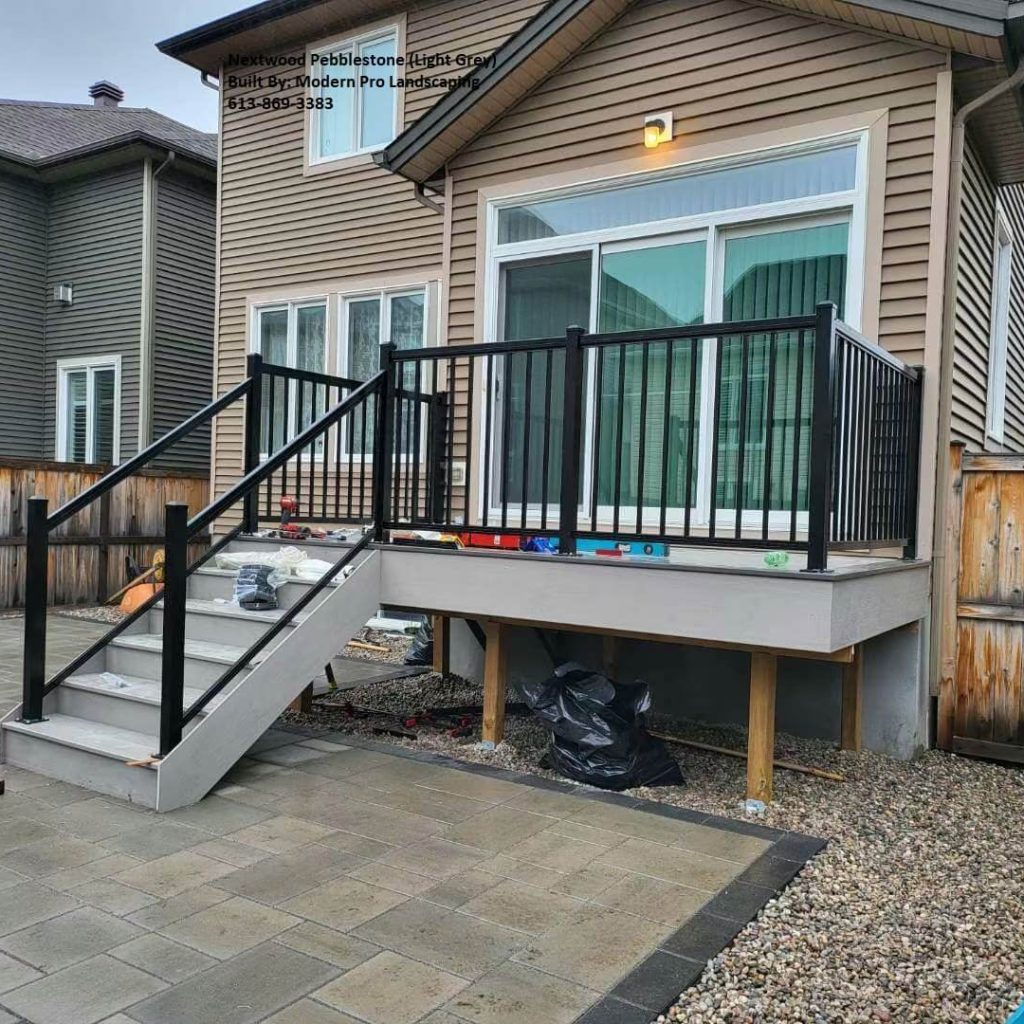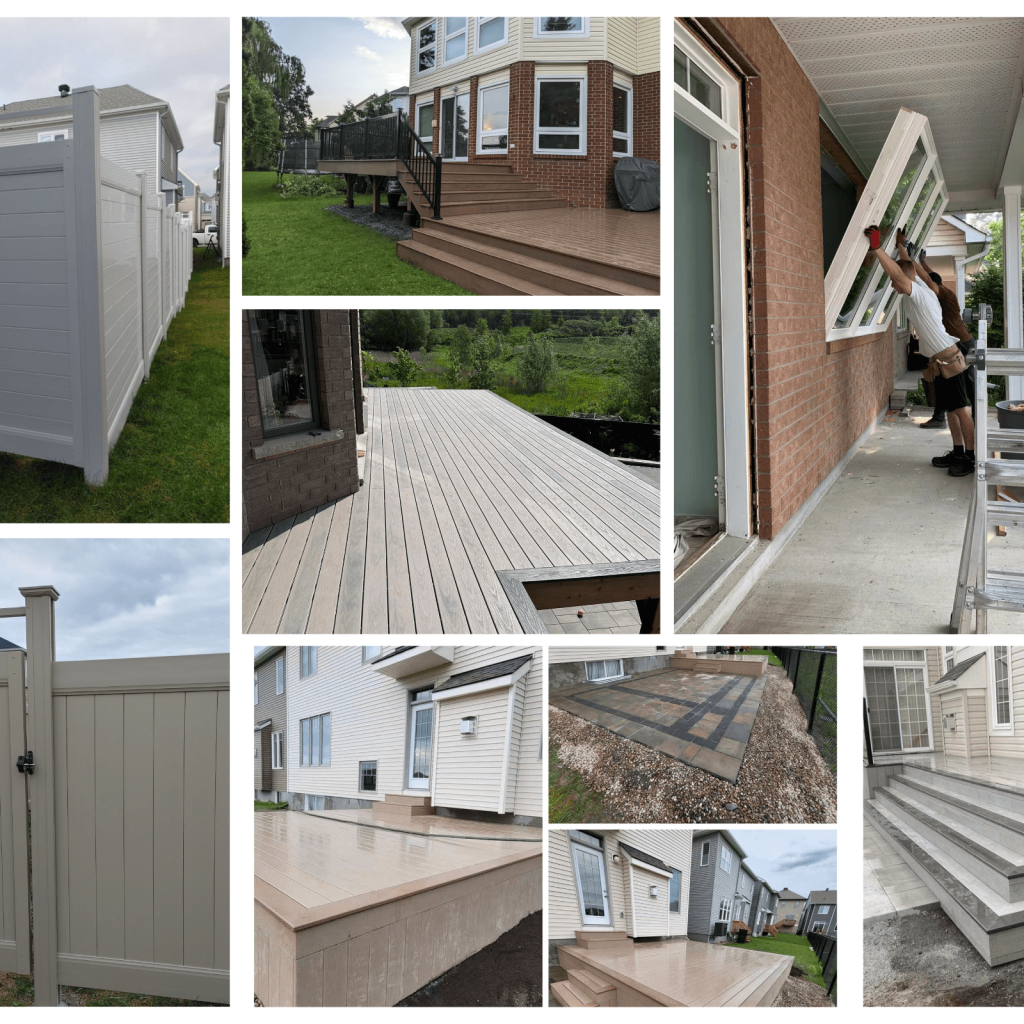How to select Deck VS. Interlock?
As a home owner, you might only be building a Deck or Interlock once in your life time. It is a big investment and you want to first educate yourself about some options. This will prepare you to ask the right questions to the landscaping contractors, compare your quotes in a meaning way, of course most important of all, eliminate surprises.
Before we jump into the detailed comparison, here is our conclusion:
Incorporating a pvc deck with your interlock project is a great way to add more texture to your yard.
If you are a home owner looking for a builder to build your PVC deck or fence, click here.
If you are a contractor looking for supplier of PVC deck or fence for your project, click here.
This link has a more detailed comparison of deck vs interlock.
WHAT’S THE DIFFERENCE BETWEEN DECK AND INTERLOCK?
A deck is a raised platform that touches the home and extends out anywhere from 5 to 10 meters and sometimes more.
Decks can be made out of a variety of different materials. While wood deck was the most common in the past, composite or PVC deck is gaining more market shares and being used in many houses.
Interlock is made out of stone, brick, or concrete, with tons of style options available.
WHAT ADDS MORE VALUE TO A HOME?
Both decks and interlocks will add value to the respective homes. Especially, the PVC deck or interlock does add more value, which has a 90% return on investment.
Wood or composite Deck, on the other hand, offers around a 50% return on investment. So, if value added is your main priority, you should go with a PVC deck or interlock, or a combination of both.
MAINTENANCE
Interlocking doesn’t really need much maintenance. Generally speaking, they just need to be cleaned from time to time. Wood decks, on the other hand, need to be cleaned, stained, and sealed with lots of work.
Not only are wood decks more difficult to maintain but also more expensive to maintain as well. However, decks can be very aesthetically pleasing and offer amazing decorative options and variations.
Here comes composite which still requires maintenance just not as much as wood or PVC deck which does not require maintenance at all.
RESISTANCE TO WEATHER
As far as weather resistance goes, interlock or PVC Deck is tougher. Stone, concrete, or ASA-coated PVC deck will thrive through both heavy rain and harsh sunlight. Wood, or Composite on the other hand, is susceptible to both. Of course, you can help prolong the lifespan of a wood deck by sealing it and cleaning it.
WHAT IS CHEAPER?
Neither deck nor interlock is particularly expensive. They both offer tons of value for their price. That said, interlock tend to run a bit cheaper than PVC deck, but exact costs vary based on a variety of different factors.
WHY DECK?
Elevated off of the ground, decks are not just aesthetically pleasing but functionally beneficial as well. There are tons of pros to decks but a few cons as well. We’ll get into these below.
DECK PROS
One of the primary pros of decks is their appearance. Decks provide an instant aesthetic shot to the properties upon which they’re built.
In addition, decks offer elevation. This gives users a loftier feel when they’re standing or sitting on them. This can enhance the atmosphere during get-togethers.
Finally, they’re good for uneven terrains. In other words, if you have a hilly yard, they’re much easier to install than patios.
DECK CONS
Wood decks are susceptible to rain and sunlight. Therefore, their lifespans tend to be limited to around 20 years or less. To get to this point, they require a certain amount of maintenance.
Composite is low maintenance and PVC is no maintenance required.
WHY INTERLOCK?
Interlock is simple, straightforward, and effective. They thrive on a number of fronts. Nonetheless, they have some cons. The pros and cons of interlock will be detailed below.
PROS
Tough, durable, and low-maintenance, interlock is designed to thrive through all manner of inclement weather. Not only are they highly resistant to water but sunlight as well. Plus, they can withstand a substantial amount of direct physical impact.
They’re also aesthetically impressive. Coming in a variety of shapes, colors, and styles, they look great on properties of all kinds.
CONS
There are a few cons associated with interlock. For one, they’re not easy to install on uneven or hilly terrains. If you are going to install them in a hilly yard, you’ll have to grade the yard first, shifting soil around prior to putting the patio down. This of course will increase the building cost or if well prepared, the end product may not be very satisfactory.
Interlock still needs maintenance since there might be weeds coming out of patio gaps in a number of years.




